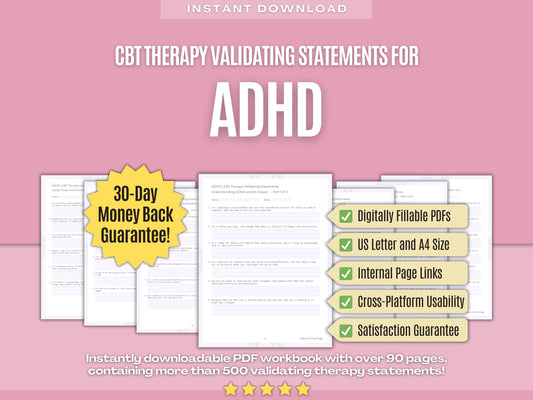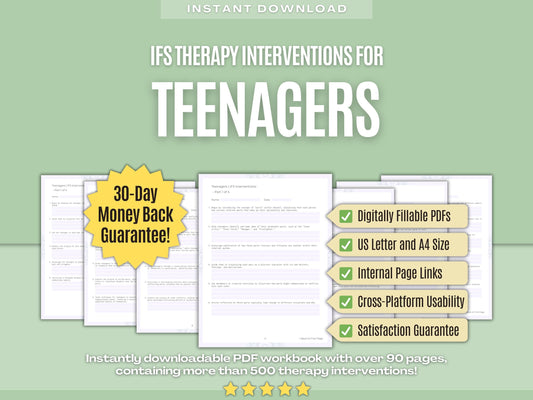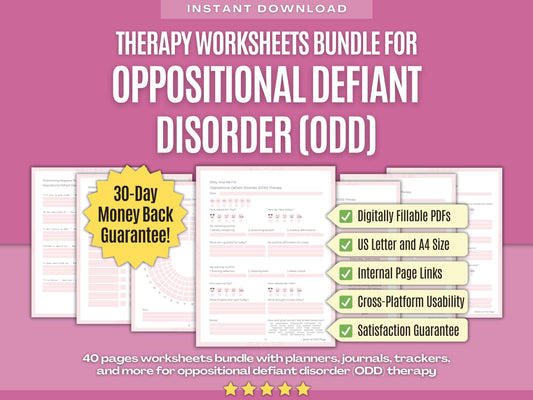Elevate Your Therapy and Guide Your Clients to Inner Healing with Our Depression Therapy Progress Notes! ✨
1. Starting Your Journey
- The client attended their first therapy session, expressing a mixture of apprehension and hopefulness about beginning their journey towards healing.
- Client shared their past experiences with depression treatment, including what has worked well for them and what they found challenging.
- We explored the client's goals for therapy, identifying specific areas they hope to address and improve upon.
- Client expressed a willingness to learn new coping skills and implement healthier habits into their daily routine.
- I reassured the client that they are not alone in their struggles and that together, we will work towards finding effective solutions.
- We discussed strategies for managing negative thoughts and challenging societal perceptions about depression.
- Client expressed a desire to explore the underlying causes of their depression and to gain insight into their thoughts and emotions.
- I normalized the client's experiences of depression, emphasizing that it is a common and treatable condition.
- We explored the client's support system and identified individuals who can provide encouragement and assistance along the way.
- Client expressed gratitude for taking the first step towards seeking help and for the opportunity to work on improving their mental health.
- I encouraged the client to communicate openly with me about their thoughts, feelings, and any concerns that may arise during treatment.
Need more? Find all 500+ Therapy Progress Notes for Depression Therapy in our Digital Workbook!
2. Understanding Depression
- During today's session, we delved into the client's understanding of depression, exploring their perceptions and beliefs about the condition.
- We discussed the potential causes of depression, including biological factors, life events, and environmental stressors.
- Client expressed a sense of relief in gaining a deeper understanding of the physiological aspects of depression and how it affects brain function.
- I highlighted the importance of recognizing the interplay between genetic predispositions and environmental factors in the development of depression.
- We discussed the concept of learned helplessness and how negative experiences can contribute to feelings of hopelessness and despair.
- Client expressed interest in exploring their own cognitive distortions and learning strategies to challenge and reframe negative thinking.
- I encouraged the client to identify any patterns of avoidance or rumination that may be contributing to their depression.
- We explored the concept of emotional regulation, discussing strategies for managing distressing emotions and building resilience.
- Client expressed curiosity about the role of lifestyle factors such as diet, exercise, and sleep hygiene in managing depression symptoms.
- I validated the client's experiences of depression, emphasizing that their feelings are valid and deserving of compassion.
- We discussed the importance of self-compassion and self-care practices in nurturing emotional well-being and resilience.
Need more? Find all 500+ Therapy Progress Notes for Depression Therapy in our Digital Workbook!
3. Practicing Mindfulness
- During today's session, we introduced the concept of mindfulness as a tool for managing depression symptoms and enhancing emotional well-being.
- We discussed the basic principles of mindfulness, including present moment awareness, non-judgment, and acceptance.
- Client shared their experiences with the mindfulness exercise, noting any thoughts, emotions, or sensations that arose during the practice.
- I introduced the concept of the "observer self," encouraging the client to cultivate a compassionate and non-reactive stance towards their inner experiences.
- We discussed the benefits of mindfulness for managing stress, reducing anxiety, and enhancing overall psychological well-being.
- Client shared their struggles with intrusive thoughts and excessive worry, expressing a desire to learn mindfulness techniques for managing these symptoms.
- I introduced a variety of mindfulness techniques, including body scan, mindful walking, and loving-kindness meditation, for the client to explore.
- We discussed potential barriers to mindfulness practice, such as resistance to discomfort or difficulty maintaining consistency.
- Client shared their experiences of practicing mindfulness outside of therapy, noting any challenges or insights they encountered.
- I provided validation and support for the client's efforts in cultivating mindfulness, acknowledging the courage it takes to face discomfort with openness.
- We discussed the role of mindfulness in fostering a sense of connection to oneself and to others, enhancing feelings of empathy and compassion.
Need more? Find all 500+ Therapy Progress Notes for Depression Therapy in our Digital Workbook!
4. Dialectical Behavior Therapy (DBT) for Mood Regulation
- Today's session focused on introducing Dialectical Behavior Therapy (DBT) as an effective approach for mood regulation in depression therapy.
- We discussed the foundational principles of DBT, including mindfulness, emotion regulation, distress tolerance, and interpersonal effectiveness.
- Client shared their experiences of struggling with intense emotions and mood swings, expressing a desire to gain better control over their emotional responses.
- I guided the client through mindfulness exercises, such as mindful breathing or body scan, to help them cultivate awareness of their internal experiences.
- We discussed the importance of emotion regulation skills in managing intense or overwhelming emotions, such as anger, sadness, or anxiety.
- Client shared their struggles with self-care and identified areas where they could improve, such as sleep hygiene, nutrition, and exercise.
- I provided validation and support for the client's efforts in prioritizing self-care, acknowledging the challenges they may face in making changes.
- We discussed distress tolerance skills as a means of coping with crises or situations that cannot be changed in the moment.
- Client shared their experiences of using distress tolerance skills in challenging situations, noting moments of increased resilience and coping.
- I introduced the DEAR MAN skill from DBT, providing guidelines for assertive communication and negotiation in interpersonal interactions.
- We discussed potential barriers to using DBT skills in daily life, such as forgetfulness or resistance to change, and brainstormed strategies for overcoming them.
Need more? Find all 500+ Therapy Progress Notes for Depression Therapy in our Digital Workbook!
5. Interpersonal Therapy (IPT) for Relationships
- During today's session, we explored the client's current relationships and identified patterns of communication that contribute to their feelings of isolation.
- We delved into the client's family dynamics and how past experiences might be influencing their current relationships.
- We examined the client's support system and identified areas where they feel lacking in social support.
- We explored the client's feelings of loneliness and discussed strategies for fostering meaningful connections.
- We discussed the client's role within their social circle and how they perceive themselves in relation to others.
- We explored the client's fears of vulnerability and how it impacts their ability to form close connections.
- We discussed the client's romantic history and identified recurring themes in their partnerships.
- We explored the client's expectations of themselves and others within relationships.
- We explored the client's coping mechanisms for dealing with relationship stress and identified healthier alternatives.
- We discussed the role of empathy in relationships and practiced active listening skills.
- We examined the client's communication patterns and identified opportunities for assertive expression.
Need more? Find all 500+ Therapy Progress Notes for Depression Therapy in our Digital Workbook!
6. Emotion-Focused Therapy (EFT) for Emotional Healing
- During today's session, we focused on emotion-focused therapy (EFT) as a means of exploring and processing the client's emotions related to depression.
- We explored the underlying emotions beneath the client's depressive symptoms, aiming to understand their root causes.
- We discussed the importance of acknowledging and validating the client's emotions as a crucial step towards healing.
- We explored the client's emotional triggers and patterns, identifying situations or thoughts that exacerbate their depressive symptoms.
- We discussed the role of self-compassion in processing difficult emotions and fostering self-acceptance.
- We delved into the client's childhood experiences and attachment relationships, examining how they influence their emotional responses in the present.
- We discussed the concept of emotional regulation and identified strategies for managing intense emotions in healthy ways.
- We explored the client's interpersonal relationships and how they contribute to their emotional world.
- We discussed the importance of setting boundaries and assertively communicating one's emotional needs to others.
- We explored the concept of emotional avoidance and discussed strategies for leaning into discomfort to facilitate emotional healing.
- We discussed the connection between body and emotion, exploring how physical sensations can provide valuable clues about underlying emotional states.
Need more? Find all 500+ Therapy Progress Notes for Depression Therapy in our Digital Workbook!
7. Psychodynamic Exploration of Underlying Issues
- Today's session focused on exploring the psychodynamic underpinnings of the client's depression.
- We delved into the client's family dynamics, examining patterns of interaction and attachment styles.
- We discussed the concept of unconscious conflicts, exploring how unresolved issues may manifest as depressive symptoms.
- We explored the client's relationship history, examining any recurring patterns or themes that may contribute to their depression.
- We examined the role of introjection, exploring how the client internalizes the expectations and judgments of others.
- We discussed the concept of repetition compulsion, examining how the client may unconsciously recreate past relational dynamics in their present interactions.
- We discussed the concept of object relations, exploring how the client's internal representations of others impact their relationships and sense of self.
- We explored the client's inner conflicts and ambivalence, examining the tug-of-war between competing desires and needs.
- We discussed the concept of psychic determinism, exploring how past experiences may continue to exert influence on the client's thoughts, feelings, and behaviors.
- We discussed the role of aggression and anger in depression, exploring how these emotions may be repressed or expressed indirectly.
- We discussed the concept of regression, exploring how the client may revert to earlier developmental stages in times of stress or conflict.
Need more? Find all 500+ Therapy Progress Notes for Depression Therapy in our Digital Workbook!
8. Soothing with Music Therapy
- Today's session focused on incorporating music therapy techniques to soothe and alleviate symptoms of depression.
- We discussed the client's emotional responses to the music, exploring how different melodies, rhythms, and lyrics impact their mood.
- We explored the concept of music as a form of self-expression, discussing how the client can use song lyrics or instrumental pieces to convey their emotions.
- We discussed the therapeutic benefits of music therapy, including its ability to regulate mood, reduce anxiety, and promote emotional expression.
- We explored the client's musical background and history, discussing any previous training or experiences that may influence their relationship with music.
- We discussed the concept of entrainment, exploring how rhythmic patterns in music can synchronize with the body's natural rhythms to promote relaxation.
- We discussed the client's cultural and personal associations with music, exploring how songs or genres may hold particular significance in their life.
- We discussed the role of music in fostering social connections and support, exploring opportunities for the client to engage in musical activities with others.
- We explored the therapeutic potential of guided imagery combined with music, using auditory stimuli to enhance visualization and relaxation techniques.
- We discussed the concept of music as a form of mindfulness practice, encouraging the client to engage in attentive listening and present-moment awareness.
- We discussed the concept of music as a form of spiritual or transcendental experience, exploring how it can evoke feelings of awe, wonder, and connection.
Need more? Find all 500+ Therapy Progress Notes for Depression Therapy in our Digital Workbook!
9. Reflecting on Progress
- Today's session focused on reflecting on the client's progress in therapy and exploring the changes and growth they have experienced.
- We explored specific changes in the client's thoughts, feelings, and behaviors since the beginning of therapy, noting any improvements or challenges.
- We discussed the client's experiences of resilience and coping, noting instances where they have successfully navigated difficult emotions or situations.
- We discussed the concept of setbacks or relapses in therapy, exploring how the client can use these experiences as opportunities for learning and growth.
- We explored the client's relationships with others, noting any improvements in communication, boundaries, or intimacy.
- We discussed the client's engagement in self-care practices, such as exercise, mindfulness, or hobbies, noting any positive effects on their mood and well-being.
- We discussed the client's experiences of setting boundaries and asserting their needs in relationships, noting any improvements in assertiveness and self-advocacy.
- We explored the client's connections with others and sense of community, noting any improvements in social support and connection.
- We discussed the client's experiences of managing stress and overwhelm, noting any improvements in stress management skills and resilience.
- We explored the client's experiences of embracing vulnerability and authenticity in relationships, noting any improvements in emotional intimacy and connection.
- We discussed the client's experiences of setting and achieving small, manageable goals, noting any successes and areas for further growth.
Need more? Find all 500+ Therapy Progress Notes for Depression Therapy in our Digital Workbook!
10. Looking Forward
- Today's session focused on looking forward and exploring the client's aspirations, goals, and hopes for the future.
- We discussed the client's values and priorities, exploring what matters most to them and what they want to prioritize in their life.
- We explored the concept of goal-setting, discussing how the client can translate their aspirations into concrete, achievable goals.
- We discussed the importance of setting SMART goals (Specific, Measurable, Achievable, Relevant, Time-bound) to increase the likelihood of success.
- We discussed the concept of self-efficacy, exploring how the client's belief in their ability to achieve their goals can influence their motivation and perseverance.
- We explored the client's fears and anxieties about the future, validating their concerns while also encouraging them to cultivate a mindset of resilience and optimism.
- We discussed the concept of growth mindset, exploring how the client can embrace challenges as opportunities for learning and growth.
- We explored the concept of self-compassion, discussing how the client can practice kindness and understanding towards themselves as they navigate their journey forward.
- We discussed the importance of self-care and stress management in maintaining balance and well-being while pursuing goals.
- We explored the concept of visualization and positive affirmations, using these techniques to reinforce the client's belief in their ability to achieve their goals.
- We discussed the concept of resilience, exploring how the client can bounce back from setbacks and persevere in the face of challenges.
We hope that our therapy progress notes for Depression therapy will help you to elevate your therapy practice and guide your clients to inner healing! Do you need more therapy progress notes for Depression therapy? Find them all in our Digital Workbook! Or do you have any questions or suggestions for us? Please feel free to contact us at any time!


















